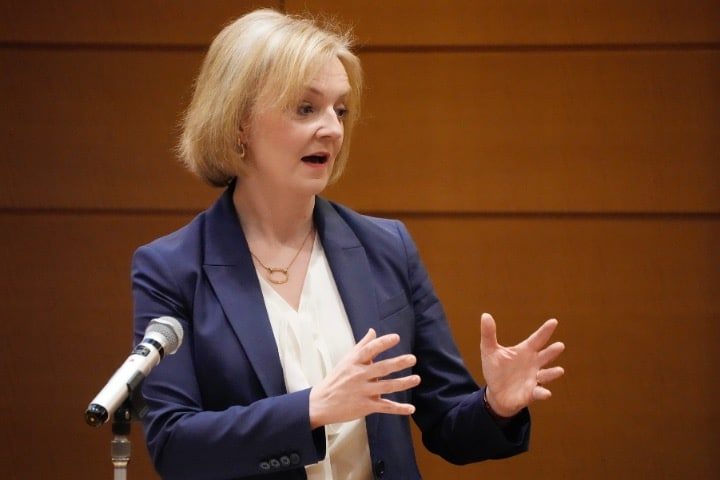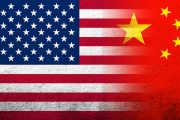
This week, former U.K. Prime Minister Liz Truss is scheduled to visit Taiwan, and to give a speech likely to provoke Beijing and potentially undermine the U.K. government’s delicate approach to China relations. Based on a report by Sky News, Truss is expected to say:
I have come here this week at the invitation of the Taiwan government because I am an admirer of Taiwan and the Taiwanese people. I want to do all I can to support your continued success. I want to increase awareness around the world of the position you are in. I am also here because I believe this is the most consequential place in the world — in the most consequential struggle of our time. Where we are today is on the front line of the global battle for freedom. The Chinese Communist Party is engaged in an ideological struggle with the free world — they are open about that. This is a battle of ideas as much as it is an attempt to grab power on the global stage.
On May 9, the day her office declared that she was poised to meet senior members of the Taiwanese government, Truss said that “Taiwan is a beacon of freedom and democracy. I’m looking forward to showing solidarity with the Taiwanese people in person in the face of increasingly aggressive behavior and rhetoric from the regime in Beijing.”
A U.K. government spokesperson said in response to Truss’ announcement of her visit: “We wouldn’t get involved in the independent travel decisions of a private citizen who is not a member of the government.”
Elaborating, a Foreign Office spokesperson said: “We have no diplomatic relations with Taiwan but a strong, unofficial relationship, based on deep and growing ties in a wide range of areas, and underpinned by shared democratic values.”
Truss’ upcoming trip comes after a series of hard-line speeches on China — in Tokyo in February and to the conservative Heritage Foundation in Washington, D.C., last month — in which she articulated her thoughts on how Western democracies should toughen their position on Beijing.
Her Taiwan speech is part of an event coordinated by the Prospect Foundation think tank, which was among the groups under China-imposed sanctions following former U.S. House Speaker Nancy Pelosi’s meeting with Taiwanese president Tsai Ing-wen.
The Prospect Foundation revealed that Truss’s address would be titled, “Taiwan: on the frontline of freedom and democracy,” and described Truss as “one of the key players in bringing the security of the Taiwan Strait into the U.K.’s international vision” during a time the country is tweaking its global strategy after Brexit and inclining toward the Indo-Pacific region.
When questioned about funding for the trip, a spokesperson for Truss said she is slated to update her entry in the register of members’ interests as per protocol upon her return from Taiwan.
Documents revealed Truss’ trip to Washington in mid-April cost the Heritage Foundation £7,600 ($9,508), encompassing flights and accommodations for her, her husband, their two children, and a staff member.
In light of statements made by Britain’s foreign secretary, James Cleverly, that London should not “pull the shutters down” on Beijing, as doing so would go against the country’s interests, the U.K. government will be keeping tabs on Truss’ Taiwan visit to see how she expresses her views on China.
According to a report published by The Independent, senior U.K. Conservatives have cautioned that the upcoming Taiwan trip could undermine incumbent Prime Minister Rishi Sunak’s attempts to maintain a delicate relationship with Beijing. The Conservatives criticized Truss for a trip that seems “selfish and disloyal” and that may “complicate” the government’s stance on China.
According to Tobias Ellwood, the chair of the Commons defense committee:
All former Tory prime ministers recognise how every single comment, speech or public engagement given will be scrutinized by the media to see if they are faithful to their successor. If there is a question that any action might challenge or distract from the party’s current agenda or electoral prospects, then the former PMs should ask themselves why go ahead as it will simply look selfish and disloyal. It, therefore, complicates the government’s own position on China.
Alicia Kearns, the Conservative chair of the Foreign Affairs Select Committee, denounced the planned visit as “the worst kind of Instagram diplomacy.” Truss’s combative moves could exacerbate matters for Taiwan, Kearns warned, dismissing the visit as a vanity project to keep herself “relevant.”
Former Foreign Secretary Sir Malcolm Rifkind said that the trip would provoke a “very adverse hostile reaction from the Chinese.” “The Chinese government will assume, because it would automatically apply in their own case, that if Ms Truss as a former British prime minister is going to Taiwan it must be with the approval of our government,” he added.
Another Tory former Cabinet minister commented: “Let’s hope she does not trigger an invasion.”
Truss’ visit risks inflicting “mortal wounds to China-U.K. relations” and would isolate the two countries, a Chinese government official warned, and Chinese Communist Party media spokesperson Victor Goa told Tonight with Andrew Marr on LBC that the trip would “make it more likely that China will exercise jurisdiction over Taiwan sooner rather than later.”
On the other hand, an ally of Truss accused those who slammed her Taiwan visit of aligning with the interests of the Chinese Communist Party (CCP), stating:
We know all too well that the Chinese government is hostile to Western visitors going to Taiwan: President Xi is trying to bully Western politicians into not visiting or speaking out on this issue precisely so that a takeover of Taiwan can eventually become a fait accompli. Liz is not going to be bullied by the regime in Beijing and those carping from the sidelines about her visit are playing into the hands of the Chinese Communist Party’s agenda and ought to be ashamed of themselves.
China claims self-governing Taiwan as its territory, and Chinese leader Xi Jinping has pledged to bring the island under Beijing’s control, by force if necessary.



